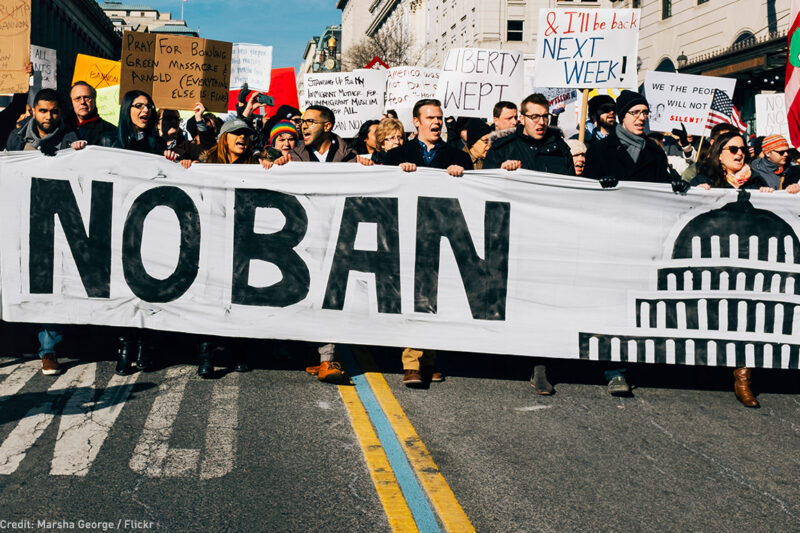The Muslim Ban ÔÇÿDrips With Religious Intolerance, Animus, and Discrimination,ÔÇÖ Rules Federal Appeals Court


We should all feel proud today. The Fourth Circuit Court of Appeals to allow the Muslim ban to go into effect. Step by step, point by point, the court laid out what has been clear from the start: The president promised to ban Muslims from the United States, and his executive orders are an attempt to do just that.
The bottom-line question, the court recognized, is whether the Constitution establishes the rules for everyone, ÔÇ£rulers and people,ÔÇØ police officers and presidents, ÔÇ£equally in war and in peace.ÔÇØ And the court answered resoundingly that it does. The government, the court explained, had repeatedly asked the court ÔÇ£to ignore evidence, circumscribe our own review, and blindly defer to executive action.ÔÇØ But the court refused: ÔÇ£We cannot shut our eyes to such evidence when it stares us in the face.ÔÇØ
And that evidence is clear and compelling.
While the text of the Muslim ban ÔÇ£speaks with vague words of national security,ÔÇØ the court recognized that in context it ÔÇ£drips with religious intolerance, animus, and discrimination.ÔÇØ The banÔÇÖs message of religious condemnation is contrary to the bedrock constitutional requirement that the government remain neutral among religions: ÔÇ£When the government chooses sides on religious issues, the inevitable result is hatred, disrespect and even contempt towards those who fall on the wrong side of the line.ÔÇØ
The framers of the Constitution recognized how dangerous taking sides would be for our country, and the Fourth Circuit today vindicated this fundamental principle.
One of the members of the court, Judge Wynn, pointed out the historical context. ÔÇ£We have matured from the lessons learned by past experiences documented, for example, in and ,ÔÇØ he explained, referring to the shameful decisions permitting slavery and Japanese internment. ÔÇ£Laid bare,ÔÇØ Judge Wynn explained, ÔÇ£this Executive Order is no more than what the President promised before and after his election: naked invidious discrimination against Muslims.ÔÇØ
And that is unconstitutional.
We should all feel proud because this is not just a victory for the plaintiffs in this case. And it is not just a victory for millions of Muslims and immigrants and their families, friends, and neighbors. This is a victory for all of us, for the independence of our courts, the force of our Constitution, and the rule of law. No one is above the law, not even the president.
These cases are not over. The Ninth Circuit recently arguments in another challenge to the Muslim ban, and a decision is expected soon. And the government may appeal to the Supreme Court. But today is an enormous victory for American values, one we should all cherish.

